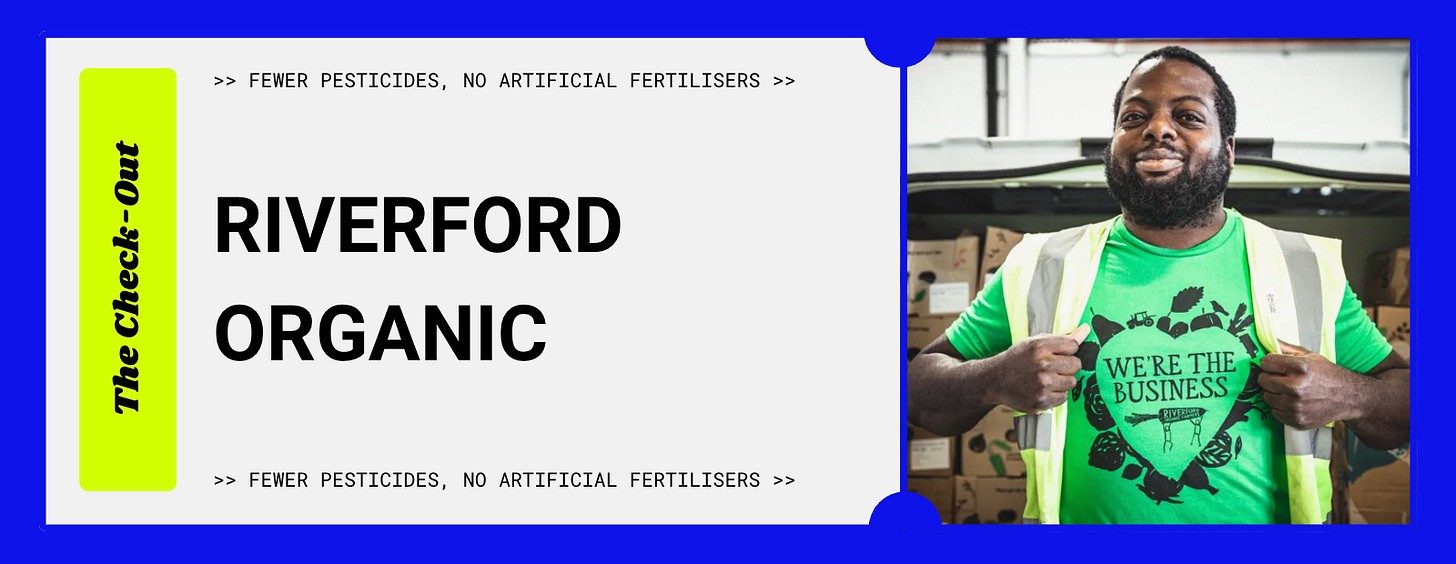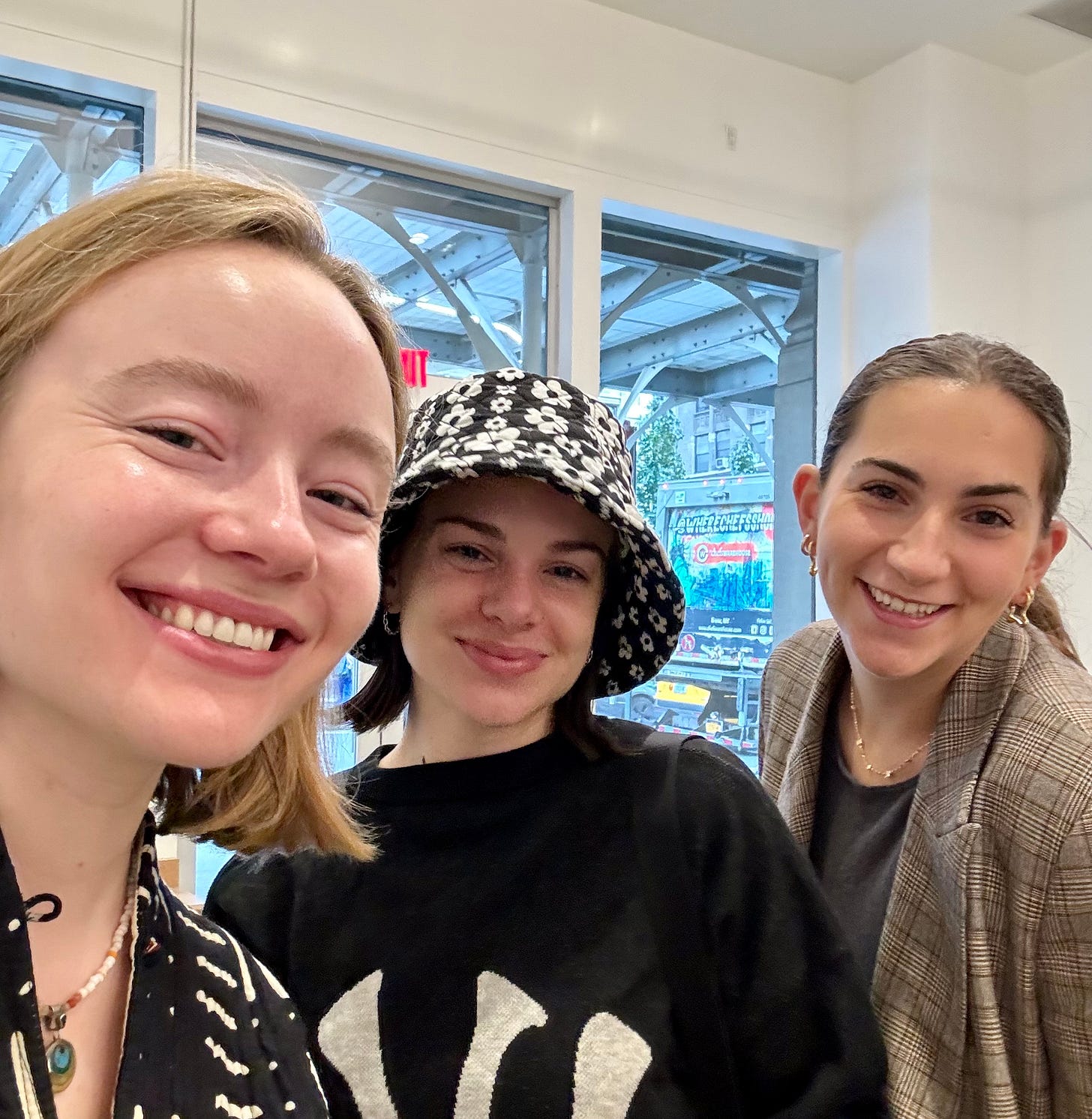🛒 The Check-Out: Riverford Organic
+ 5 cool climate events + what's in our basket - About Blanks, Jeni's & Magic Balm...
Happy Thursday! Welcome to The Check-Out - your weekly dose of climate x consumer goods inspiration, and your discovery box of products and events the Following the Footprints team are loving this week. It’s great to have you here.
Whew - September was quite something huh? We had team at New York Climate Week, conferences across Europe like The Drop, being selected for Edie 30 under 30 and so much more. There’s nothing better than being home. In fact, there is one thing… being home and having a delicious organic veg box delivered to your door (you knew it was coming). This week we’re taking a long and loving look at Riverford Organic, an organisation oh so high on our list for all the best reasons - employee owned, natural fertilisers, local suppliers and more.
After we dig into Riverford Organic, we’ll share what Jenny from the Following the Footprints team has loved and consumed this week and 5 Climate x Consumer Goods events coming up. There’s also a sneaky pic from the team at the end. Let’s dig in…
> Brand Spotlight
Brand Spotlight: Riverford Organic
Armed with the belief that amazing veg has the power to change lives and the world around us, Riverford Organic are on a mission to inspire people to cook with amazing veg that makes a positive impact - without the use of synthetic pesticides. More than just a veg box, Riverford are champions of organic farming, certified B Corp and 100% employee owned.
What’s the issue with synthetics?
Only this last week has mainstream farming’s reliance on synthetic pesticides been in the news with the reality of post-Brexit farming and the difficulty in achieving the farming industry’s 2040 net zero goals. Farming is currently accountable for 12% of UK total greenhouse gas emissions, predominantly from nitrous oxide from synthetic fertilisers and ‘cides, alongside livestock manure and methane. While carbon dioxide from energy and fuel are less contributing factors.
What does ‘organic’ even mean?
“Organic is a system of farming and food production. Organic farmers aim to produce high-quality food, using methods that benefit our whole food system, from people to planet, plant health, to animal welfare.” - The Soil Association.
From higher welfare standards, no genetic modification and increased biodiversity - organic farming works with nature, not against it. Riverford Organic source 100% organic produce, kinder to the planet and working with nature not against it since 1987. Sourcing from soil association certified suppliers with high standards and practices and implementing biodiversity action plans across their farms, creating new habitats with ponds and hedgerows.
Let’s take a closer look at why and how Riverford are implementing a fewer pesticide, no artificial fertiliser approach on this mission…
Fewer pesticides…
The issue - Synthetic ‘cides have been instrumental in the global decline of insect populations.
The organic solution - Organic farmers create a natural balance between plants and animals using cover or companion crops for integrated pest management, for example clover can be planted alongside oil seed rape to restrict the cabbage stem flea beetle or buckwheat is a natural weed suppressant.
Riverford’s approach - Implemented a three year strip tillage trial where only the planting strips or beds are tilled and the remainder of the field is left undisturbed and soil disturbance is minimised. With benefits of improved soil health, better soil moisture in summer and more carbon sequestered in the land.
No artificial fertilisers…
The issue - 50% nitrogen oxide emissions occur from nitrogen-based artificial fertilisers on farms. With a long lifetime, nitrous oxide accumulates in the atmosphere and is a high warming pollutant.

The organic solution - Soil health is a key pillar of organic farming and organic farming builds healthy soil through ‘fixing’ soils with plants. For example, legumes capture atmospheric nitrogen and return it to the soil, for nitrogen rich soil, avoiding the need for synthetic fertilisers. Organic farms use crop rotation with each field cycled through various crops with sequences design to keep the soil naturally fertile, well structured and free of disease.
Riverford’s approach - Going peat-free is high on their agenda as peat compost damages biodiversity, ecosystems and releases significant amounts of carbon into the atmosphere each year. Riverford are spearheading a two-year multi-partner project to replace the use of peat in field-scale vegetable growing by identifying alternative ingredients for a peat-free seedling block.
What is the whole-farm Soil Association assessment?
Completing Soil Association assessments with suppliers, Riverford has built whole-farm improvement plans for 10 farms in their Soil Association Exchange Pilot with the target for 20 more by April 2024. The tool evaluates impact on water, carbon, biodiversity, animal welfare, soil and society. Let’s dig into the opportunities they have identified for key improvement with their suppliers…
Increase in-field biodiversity, e.g. pollinator strips, beetle banks, agroforestry.
Enhance hedge management.
Reduce on-farm fuel use.
Reduce livestock emissions.
Increase carbon offsetting features on the farm, e.g. create more woodland.
Increase the organic matter in soil.
Cultivate the soil less.
Longer rotations (cycles of different crops or livestock) in fields.
More diverse leys (grasses or legumes grown as part of a rotation, to build soil fertility).
Improve efficiency of irrigation, e.g. don’t rely on abstraction (extracting water from natural sources), and minimise any wasting of water.
What else is Riverford doing?
Having cut delivery emission by 29% since their FY18 baseline, Riverford is investing in an electric fleet for all delivery vans. Currently at 30% with the target to be 100% electric by 2025.
Investing in wind farms to reach their net zero by 2040 goal.
Creating UK woodlands and investing in agroforestry systems to plant trees including walnuts, hazelnuts and chestnuts for carbon sequestration.
With a promise to reduce, reuse, recycle, Riverford have reduced plastic use per delivery by 42% since their FY18 baseline.
30 tonnes of plastic saved every year with home compostable packaging from fresh fruit and veg.
70% veg is UK grown and meat is 100% British, sourcing from small independent producers.
No air freight, instead choosing sea freight which has 40-50x less emissions than air. When road is required, HGV trucks are chosen for efficiency and pallet optimisation ensures maximum usage of space.
Fighting food waste through the food waste hierarchy. Canteen meals, veg for staff, charity donations or for animal feed ensures on farm food waste is reduced.
100% green energy since 2007 and recently installed solar panels across three sites.
100% employee owned business.
Vegucation! Launched a partnership with Chefs in Schools to train 255 school chefs and reach 40,000 children for better food on school plates.
The hidden carbon costs of food production are often hidden within supply chains and buried in the soil. Riverford is an example of a business doing it better, with huge commitments to cutting carbon, reducing plastic and sourcing from suppliers who share their ethos - you can even check out exactly who their growers are. However it is the progress that they have made towards biodiversity projects and partnerships built with their suppliers to reduce impact on-farms within their supply chain, using tools like the whole-farm assessment, that sets them apart from the crowd. They really are more than just a veg box.
Want to learn more about Riverford Organic?

> In Our Basket
🔎 What we loved and consumed this week:
Jenny here, your regular ‘team favorites’ wrangler. This week, I’m being indulgent and giving you three from myself:
You could call me biased, but even if my name wasn’t Jenny, I swear I’d still love Jeni’s Ice Creams. The Milkiest Chocolate is especially delightful; each flavor from this B Corp is made in partnership with the ‘growers, makers, and producers who supply them with ingredients’ - see here.
I recently had some shoulder soreness and picked up this Dr. Bronner’s Magic Balm relief. Not sure about long-term benefits, but it’s organic (great) and very ‘icy hot.’I was already a fan of the company and became a bigger fan after all of their recent transparency about their 5-to-one executive salary cap and employee benefits.
We’re strong supporters of About Blanks in my household because they combine two of my passions: vintage books, and buying notebooks that I one day hope to use. Giving old, overlooked books a new life as blank-page notebooks is such a simple and excellent idea!
> Monthly Events Roundup!
📆 5 Consumer Goods x Climate Events:
Browse 20+ upcoming consumer x climate events, and submit yours.
5th October - GREEN GLAM: Sustainable Fashion Pop-Up in London
Organisers: The Conduit
Location: The Conduit, London, UK
8th October - Sustainable Fashion Leadership in a Changing Landscape
Organisers: Seismic, Ruby Harlow (FTF Team Member!)
Location: x+why, London, UK
9th October - FOOD #2: Communal Meal & Storytelling Gathering
Organisers: Creative Time
Location: CTHQ, New York, USA
10th October - SoS Impact: F&B Summit
Organisers: Altruistiq
Location: London, UK
10th October - Decarbonization: Insights, Tools, and Strategies for Effective Sustainability
Organisers: Work on Climate, OnePointFive
Location: Online
That’s it for today!
Know a brand we should spotlight next? Let Leone know!
Have links that can make the team learn or laugh? Share them with us, we might just share them in The Check-Out next week.
Hungry for more? You’ll see us on Monday! That’s when we suit up and get serious, digging into a topic that is guaranteed to make you look smart at standup.
Much love,
Team FTF








